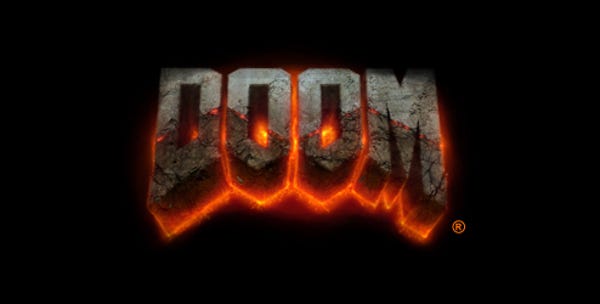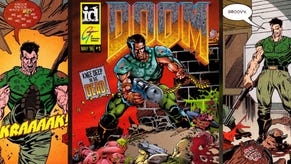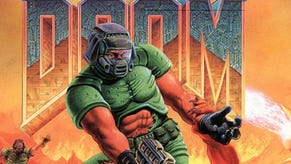The Obligatory QuakeCon 2013 'Where's Doom 4' Chat
"the world will know"
It's time for another grand QuakeCon tradition! Ever since the paleo cretacean era of 2008, I've asked id Software the same question once a year: "So, where's Doom 4?" Then we have a quick, largely insubstantial discussion about something else entirely. Eventually, however, my dogged determination to mention Doom 4 at least three times per sentence and occasionally roll my eyes back and just start screaming its name prevails, and my reward is a few tasty, tasty tidbits. Here's this year's conversation, preserved in that most immortal of fossilized tree saps: language.
RPS: Why no major announcements from id during this year's QuakeCon?
Tim Willits: It's like Pete Hines said a few months ago: when we have something to talk about, the world will know.
RPS: A few QuakeCons ago, id pronounced that we'd definitely see Doom 4 soon. Now we definitely haven't. What went wrong?
Tim Willits: We looked at the game and wanted to make sure it was awesome, so we kind of reevaluated it a bit. Again, I hate to be this guy, but when we can talk about it, we'll talk about it.
RPS: Do you have a timeframe for that? Soon-ish?
Tim Willits: There's no timeframe.
RPS: Why did you wear a Doom shirt on stage during the QuakeCon keynote? Were you trying to taunt us? Play awful, destructive games with our hearts?
Tim Willits: Actually, this is the truth: I was gonna wear another shirt, but I forgot to pick it up. So I went down to the [show floor] store, and I was like, "Give me a Quake shirt and give me a Doom shirt." Then I put the Quake one on and my jacket over it, and I was like, "Yeah, I like the Doom one better." That is the truth. You now have the scoop on why I was wearing a Doom shirt [laughs].
RPS: You have a new artist who came over from Pacific Rim, of all things. Is Doom 4 now a Pacific Rim game? Is that the big secret?
Tim Willits: [laughs] That's funny. No one has to worry about that.
RPS: Awww. I kind of wanted to worry about that.
Tim Willits: I think Guillermo del Toro might have a couple things to say if we did it.
RPS: Well, don't use the license. Just fill Doom 4 with giant monsters and let me be a multi-stories-tall megaton robot. That's basically what Doom has always been about, right?
Tim Willits: [laughs]
RPS: But seriously, why all the secrecy? Is id in a state of flux? Where does that leave Doom? Is it still even a thing?
Tim Willits: We are definitely focusing our attention on making a great game. Like I've said before, when everyone marches to the same drummer, you can make success. We really tried to streamline production. We've taken distractions out. We really are working like a much better, well-oiled machine. John [Carmack] hinted a little bit about that during his talk, where he discussed some of the help we're giving the Machine Games guys on Wolfenstein - how that core tech can help with other engines.
RPS: What about Todd Hollenshead's sudden departure? Conventional wisdom says that when your president/CEO of nearly two decades suddenly takes off, that's a sign of pretty serious upheaval.
Tim Willits: You know, it's funny. To everyone else it came as a shock, but for us - for me, because I've known Todd for so long - it was kinda natural. He was with the company for a long time, and you know, all good things must come to an end. Trust me: I've asked him a lot of questions about hosting QuakeCon. I texted him, and he texted me back. He's been a big help.
RPS: Is he still working in games?
Tim Willits: I'm not sure what he's doing.
RPS: Huh. OK then. When you were in the final stages of getting RAGE out, you talked a lot about how you couldn't afford to do these massive, seven-year development cycles in this day and age. But Doom seems to be in danger of going down that road. Has it been hard to change your ship's course - to push id in the direction of faster dev cycles?
Tim Willits: It takes a while to turn a machine, but we've finally got it. Gears are moving. And Bethesda's been great. They've really helped us sort things out. Working with the other sister studios has really helped us. It's guided us out of [our old mindset]. You know, we've been around a long time, and things change. It's been nice to have Bethesda around.
RPS: Things seemed rocky there for a bit. I mean, there was that Kotaku article about a fair amount of internal strife, trouble getting the Doom and RAGE teams to merge well, etc.
Tim Willits: I know, I know. And you know, Pete Hines and I talked, and that's when we came up with the statement we sent out. I think it works. But you know, you always get that [in game development]. And really, if we weren't influential, if people weren't interested in what we're working on, you wouldn't have those types of stories. But people are interested in what we're working on, so sometimes people just like to, you know, dig up trash.
RPS: Are you still using id Tech 5 for Doom? Or are you toiling away on a new version of your engine in light of all the "next-gen" madness?
Tim Willits: The core tech guys are developing new stuff in-engine, and we have the new hardware so we're looking at what sorts of things we can do. So we're growing the technology because, remember, the technology was built to always be expandable. To get us into the future. So we will continually develop that technology, and at some point we'll change the number.
RPS: It's an interesting time to be so high-end tech-focused, given that engines like Unity are swinging things in the complete opposite direction - de-emphasizing top-of-the-line bells and whistles in favor of usability by everyone.
Tim Willits: And sometimes that stuff takes off. You cannot predict crazy success. You can try to foster creativity. You can try to build a process. But it is exciting that we have people who can come up with ideas that explode and are just amazing.
RPS: It really is! But graphics seem to be less and less of a factor for many people - whether they play smaller indie games or not. Where does that leave a company like id that specializes in that sort of thing?
Tim Willits: It's becoming more and more difficult to shock and awe people with technology. And there will always be studios that develop new tech to push things forward. But the great thing is that we also have studios that can do things with smaller engines and be successful. It's always been about how fun the game is. Technology has always helped that and gotten people to pay attention to something, but at the end of the day, it's got to be fun.
RPS: Even so, is it a little bit frightening to lose one of your biggest calling cards? Or for it to become significantly less important in the span of just a couple releases from id?
Tim Willits: No, not really. As long as the next game we make is great, as long as we can help other Bethesda studios like Machine make something great, I think we'll be fine.
RPS: DOOM 4 DOOM 4 DOOM 4 DOOM 4. I mean, er, Thank you for your time.
So there you have it. We've reached the end of that amusingly frustrating ride. I wasn't expecting to learn a whole lot, but what I got was only slightly better than a whole lot of nothing. The takeaways? Doom 4's development reset has left id in a weird place, and I don't imagine we'll be seeing much of the game for quite some time. Maybe not even during next year's QuakeCon. Meanwhile, there's been some high-level changes to the id roster, perhaps out of necessity to inject some new life into a reportedly Call-of-Duty-esque, rather uninspired Doom 4.
But this one project is all id's working on - at least, as far as games go. No RAGE 2, no anything else. Willits did take every opportunity to stress id's development of in-house tech for Bethesda, though. It might sound like utter blasphemy, but I could see a future in which that becomes the legendary (but recently less-relevant) developer's primary role.
Oh, and one last thing: it's worth noting that Willits never once mentioned Doom 4 by name. This apparently happened to many other reporters as well. Me, I plan to do at least try and do some more digging. I'm getting a bit tired of snoozing through the same old script year after year.










